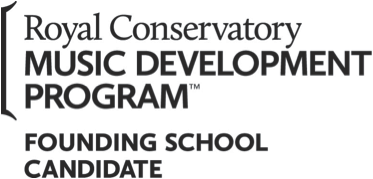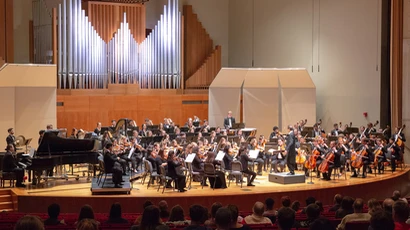
In Brief:
The Royal Conservatory Music Development Program (MDP) is modeled on a well-established system. It is designed to inspire excellence through individual student assessments and allows students to celebrate accomplishment and track their progress with others across the country. It also supports teachers with high-quality and innovative resources. Students can enter the MDP at any level and can move from level to level at any pace.
Now that the Fredonia School of Music Musical Journeys Program has applied as a Founding School in the initiative, all members of the faculty and our community can become involved, as desired, guiding individuals in instruction and national standards assessment.
Who should use the teaching materials of MDP?
Our music majors could benefit from this. Faculty should review the performance and academic syllabi available online, which includes, among other things, a useful collection of repertoire. The syllabi can be used to help push students toward more structure, clear expectation and results. The faculty is able to decide case by case what to use and how to use it.
We can also use MDP to shore up and organize MUS 104 classes. The faculty assigned to MUS 104 sections can decide if the MDP materials will be useful for their particular section.
We will use MDP to also bring more structure to the private lessons taught in Musical Journeys. When a child is taking lessons from one of our students but then has to study from another music major after he or she graduates, MDP’s syllabi will provide a mechanism for continuity. This can be useful for New Horizons members, too.
About the assessments
By being a Founding School, we become one of the locations where testing is done. The assessment system is all organized by MDP, and it includes both performance and academic areas at a full range of levels. One of the primary benefits to students is that they really get to know where their skills and knowledge stand on a national (U.S.) scale. While these assessments do have a fee associated with them (charged to the student being assessed), the results from the assessments can be valuable—verification, motivation, encouragement, and potentially standards to be cited on a resume, on a grad school app, or in a job interview. We have also talked about using assessment scores for course placement.
How does a student know the assessment level?
Students and teachers should consult the syllabus/program guide to determine the appropriate level for initial entry. Students move from level to level at their own pace.
When do assessments occur?
For the detail of currently planned dates and Center locations, please visit:
http://www.musicdevelopmentprogram.org/students-and-parents/assessment-center-dates-0
How does a student register for an assessment?
Complete and submit your Registration Form (PDF) and payment to:
Fredonia School of Music
Attn: Music Development Program / Marc Levy
1144 Mason
The State University of New York at Fredonia
Fredonia, NY 14063
DEADLINE: Thursday, March 14, 2013
Note: When students who are associated with Fredonia register for assessment, whether they are music majors, non-majors, or a community adult or child, we want them say that their home program is Fredonia. We hope for 25 assessments at the end of this semester taken by individuals who say that Fredonia is their school, regardless of where they actually take the assessment. Everyone who takes an assessment must register for it in advance.
What do the students get from an assessment?
- An objective, third party evaluation, based on a nationwide standard
- A one-on-one experience with a professional, program-certified adjudicator in a warm and welcoming environment
- A report from the adjudicator providing a breakdown of the numerical grade and constructive written comments
- A Certificate of Achievement
What is included in a typical Performance Assessment?
- Performance of three to five pieces of repertoire depending on level
- Performance of one or two études that focus on an aspect of performance skill appropriate for the level
- Performance of technical skills such as scales, chords, and arpeggios, consistent with the level. An assessment includes a representative sampling from the published list of requirements.
- Musicianship skills, appropriate for the level, such as aural identification of intervals, chord qualities, cadences, and ear-to-hand playbacks of rhythms and melodies.
- Rhythmic reading and sight playing.
Who are the evaluators?
The adjudicators are teachers and performers from across North America, each a specialist in one or more areas represented in the program. Adjudicators undergo a competitive admissions process before being accepted as apprentice adjudicators. Apprentices complete an intensive series of lectures, demonstrations, and a practicum, coupled with a full year of observation in the field before promotion to full adjudicator. All adjudicators engage in yearly professional development and are subject to annual performance reviews.
How can I find out more about the Program?
All information and specific requirements can be found at:
http://www.musicdevelopmentprogram.org/program/syllabi

